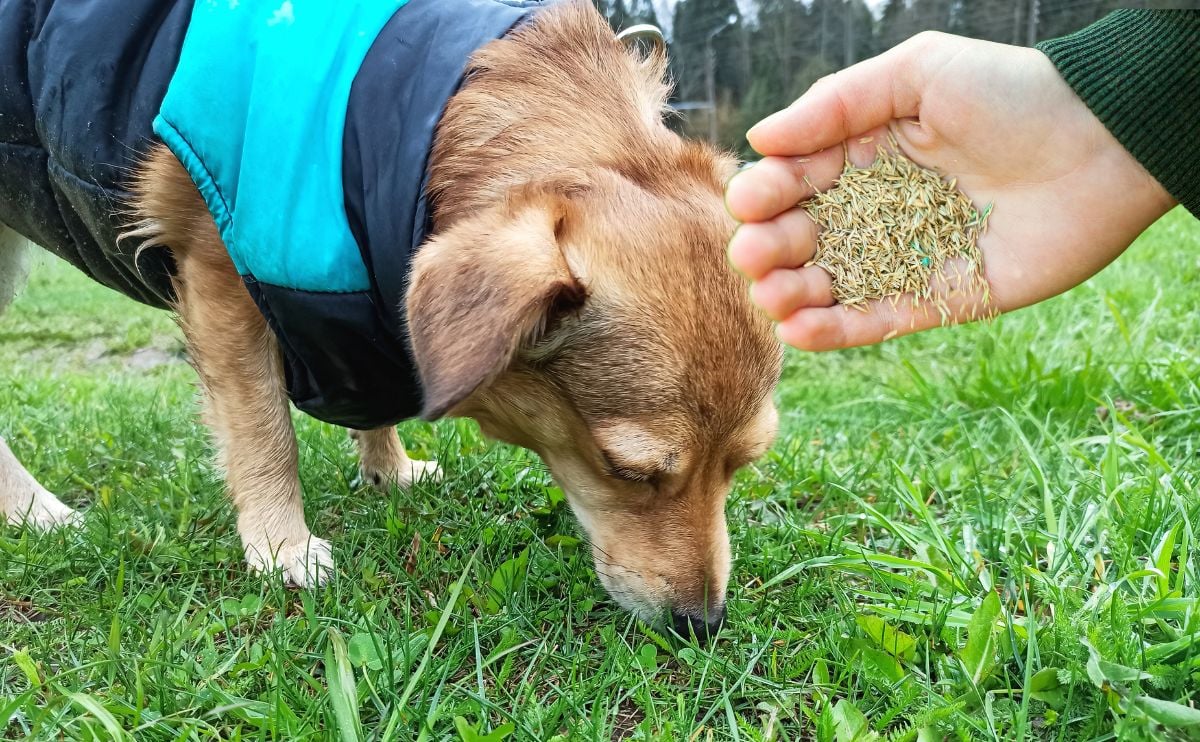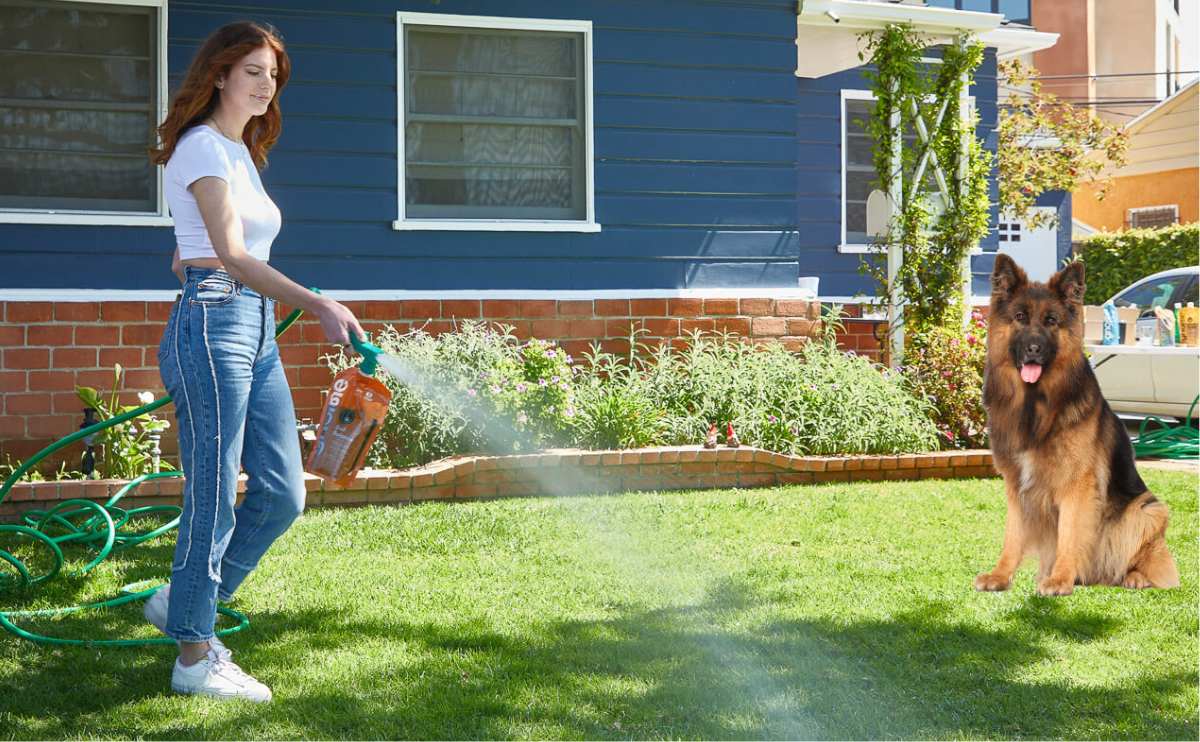When you purchase through links on our site, we may earn a commission. Here’s how it works.

Should I let my dog sleep in my bed? If you’re struggling with this question, you’re certainly not alone. There are definite proponents for both sides, but there’s no definitive answer — it comes down to personal preference in most cases.
The consensus is that you won’t harm your dog by having him sleep with you. However, there are several factors you should consider to make sure this is a comfortable choice for both you and your pup.
A 2015 survey by the American Kennel Club found that 45% of owners let their dogs sleep in their bed, while 20% said they crate their dogs at night, 17% use a dog bed, 14% have their pups sleep elsewhere indoors and 4% use an outdoor shelter.
Factors To Consider
Here are some potential concerns you’ll want to think about before making your decision about sleeping with your dog.
Your Dog’s Health
If your dog has painful arthritis or major joint issues, his body may need more support than your mattress can provide, especially if you like a softer bed. Some dogs with musculoskeletal issues need firm support to ease their aches and pains. If this is the case with your pup, you may want to consider an orthopedic dog bed, which you can place on the floor near your bed.
Another issue to consider for older dogs is incontinence. As dogs age, their bladders become weaker and could leak when they lie down on your bed. Of course, you could always put pee pads down on your bed to keep your sheets dry if you still want your buddy in bed with you.
Dogs also can carry fleas, ticks, worms, and intestinal parasites that cause us illnesses. Sleeping with dogs increases your exposure to these cruddy critters. But as long as you’re vigilant with keeping your pup parasite-free, this shouldn’t be a huge concern.
Your Dog’s Behavior
If your dog is aggressive and extremely territorial about his spaces, you may not want to introduce him into your bed. Dogs with these issues may bark and growl to protect their spot on your bed. However, most well-adjusted and well-behaved dogs likely won’t exhibit these behaviors and will share your bed happily.
Your Allergies
Even if you don’t have an allergy to dog dander, other sensitivities can be triggered by co-sleeping with your furry friend. When dogs go outside, dust, pollen, and other irritants cling to their fur, and these can end up in your bed.
However, if allergies are a concern, it would be a good idea to run an air purifier and wipe your dog down with a damp towel or a bath wipe before bed. Bathing your dog and washing your sheets more frequently can also reduce your exposure to allergens.
Your Sleeping Habits
Are you a light or heavy sleeper? Does your dog move around a lot when he slumbers? Your quality of sleep is one of the biggest concerns to think about. If you’re a light snoozer, your dog could disrupt getting a good night’s rest.
Many dogs want to lay very close to their pet parents, and them rolling over, kicking or scratching could wake you up. And if your dog snores or dreams loudly, this could also pose a problem. Some owners train their dogs to sleep at their feet, so you could consider this option to help reduce disturbances.
A Sense Of Security
If you live alone, having your dog in bed with you can help you feel more secure. Many dog owners feel safer and rest better when snuggled up with their pups. Co-sleeping with your dog can ease anxiety because dogs are always on the alert if something goes bump in the night.
The close physical contact can also help relieve stress and even lower blood pressure levels. Dogs also make warm, cozy bedfellows. And co-sleeping may prove beneficial for dogs, especially for those with separation anxiety.
Bonding
If you’re not home most of the day for work or other reasons, spending quality time bonding with your dog is challenging for sure. Sleeping together can be a great way for you and your dog to form a stronger bond.
Frequently Asked Questions
Here are some of the top questions our readers ask about sleeping with dogs.
Does Co-Sleeping Create Dominance Issues?
There is an old-school belief that dogs sleeping in human beds increases dominance problems. The thought behind this largely debunked theory is that dogs know you’re dominant because you tower over them when you’re upright. But if you’re both lying together on the same level, your dog can get confused about who’s the alpha. Most animal behaviorists these days disagree with this view.
Why Does My Dog Sleep So Close To Me (Or On Top Of Me)?
Canines are pack animals, and your dog considers you part of his pack. From birth, puppies have the instinct to feel comfort and security by being physically close to their littermates — this is why they pile on top of each other. And this packing instinct stays for life.
It’s not only a need for closeness and connection, but it’s also a sign of affection. Your dog staying so close to you is his way of telling you that he feels safe with you. Most dogs need this consistent closeness to feel happy and cared for.
Our Team Weighs In
We asked some of our team members about their sleeping habits with their dogs. Here’s what they shared.
I think it should ultimately be up to the household. I don’t let my dog in my bed. I don’t want to sleep in a bunch of dog hair, and there’s not enough room for her in it! However, if it were up to my husband, she’d be curled up in bed with us each night. Instead, she has her own bed in our bedroom that she loves to curl up on. When she has sleepovers at my in-law’s home, they let her sleep in the bed with them, and she loves it. The stories they have the next morning are always funny. She likes to sprawl out completely and press her paws up against their backs. I’m not sure how they sleep with her like that!
– Kimberly A.
Our pup sleeps in bed with us, snuggled between the pillows and the headboard. She sleeps hard and doesn’t take up much space, so we don’t mind that she’s sharing the bed (except for the occasional, accidental kick in the face in the middle of the night when she’s chasing squirrels in her dreams). Surprisingly, her snoring is soothing, and having her warmth and presence helps me sleep. We bathe her and clean our sheets regularly to minimize germs, spritz the bed with linen spray at night to keep them fresh, and we usually use a roller brush to pick up hair and debris from the pillows in the morning before making the bed. She rarely needs to go out in the middle of the night (we take her right before bed and first thing in the morning, which helps).
– Sadie C.
No strong feelings, but I let dogs sleep where they want. During the day, Lyle sleeps in my bed quite a lot (my office is half of the bedroom, and I like to think he considers this hanging out with me), and at night Horatio sleeps at our feet most nights. There are frequently a couple of cats in there throughout the night, off and on as well.
– Dane M.
What Does Your Dog’s Sleeping Position Reveal?
Have you ever wondered why your dog sleeps in certain positions? Check out this fascinating video to learn what these positions reveal about his personality, health and sleeping needs.
Either Way, Invest In A Good Dog Bed
Whether you welcome your dog to your bed at night or not, dogs love having a dog bed for their frequent naps. Be sure to check out our dog bed reviews, where we recommend the best beds for all types of dogs and spaces in your home.
Tagged With: Sleep





